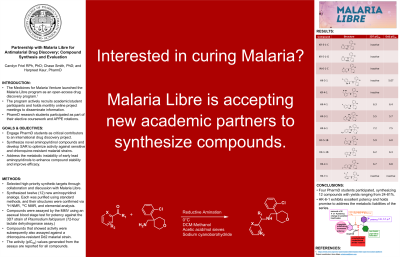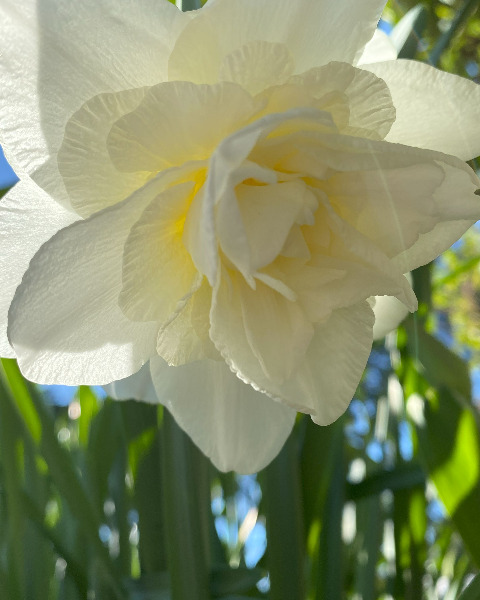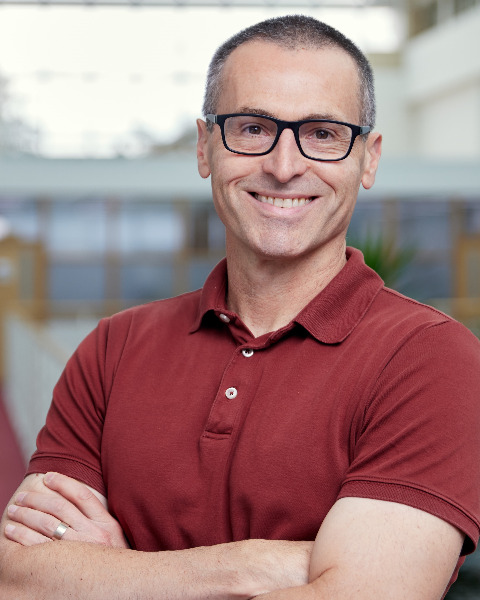Chemistry
(264) Partnership with Malaria Libre for Antimalarial Drug Discovery; Compound Synthesis and Evaluation


Carolyn Friel, PhD
Professor of Medicinal Chemistry
MCPHS University�Worcester/Manchester, United States
Harpreet Kaur
Student
MCPHS
Collegeville, Pennsylvania, United States
Chase Smith, PhD
Industry
Optibrium, United States
Primary Author(s)
Co-Author(s)
Objective : The Medicines for Malaria Venture launched the Malaria Libre program as an open-access drug discovery program for pre-clinical candidates. PharmD students synthesized compounds for this program during elective courses/APPE rotations. We hypothesize that through the synthesis of novel aminopyridinol compounds, we will identify structure-activity relationships that pinpoint core modifications consistently yielding compounds with high potency against both sensitive and chloroquine-resistant malarial strains.
Methods: We identified high-priority targets through collaboration with Malaria Libre. Global partners provided starting materials. We synthesized 12 compounds utilizing reductive amination. Compounds were purified and confirmed via 1H NMR, 13C NMR, and elemental analysis. Compounds were then evaluated for activity in the asexual blood stage test. Compounds were assayed for potency against the 3D7 strain of Plasmodium falciparum using the 72-hour lactate dehydrogenase assay (LDH). Those compounds that showed activity were also assayed using the chloroquine-resistant Dd2 strain. IC50s were calculated for all compounds.
Results: Twelve compounds were successfully synthesized, purified, and analyzed with percent yields ranging from 23 to 81%. The 3D7 LDH IC50s ranged from 25 uM (no activity) to 0.19 uM (good activity) and the Dd2 LDH IC50s ranged from 25 uM (no activity) to 0.16 uM (good activity). A rudimentary SAR was developed.
Conclusions: The Malaria Libre program provided an excellent opportunity for a small academic laboratory to engage in a supported project with global significance. Access to leading malaria researchers worldwide through monthly meetings, as well as the provision of no-cost biological assays, were highlights of our involvement. The compounds synthesized in the laboratory exhibited a range of activity levels and serve as the foundation for the next iteration of compounds.
Methods: We identified high-priority targets through collaboration with Malaria Libre. Global partners provided starting materials. We synthesized 12 compounds utilizing reductive amination. Compounds were purified and confirmed via 1H NMR, 13C NMR, and elemental analysis. Compounds were then evaluated for activity in the asexual blood stage test. Compounds were assayed for potency against the 3D7 strain of Plasmodium falciparum using the 72-hour lactate dehydrogenase assay (LDH). Those compounds that showed activity were also assayed using the chloroquine-resistant Dd2 strain. IC50s were calculated for all compounds.
Results: Twelve compounds were successfully synthesized, purified, and analyzed with percent yields ranging from 23 to 81%. The 3D7 LDH IC50s ranged from 25 uM (no activity) to 0.19 uM (good activity) and the Dd2 LDH IC50s ranged from 25 uM (no activity) to 0.16 uM (good activity). A rudimentary SAR was developed.
Conclusions: The Malaria Libre program provided an excellent opportunity for a small academic laboratory to engage in a supported project with global significance. Access to leading malaria researchers worldwide through monthly meetings, as well as the provision of no-cost biological assays, were highlights of our involvement. The compounds synthesized in the laboratory exhibited a range of activity levels and serve as the foundation for the next iteration of compounds.

.png)